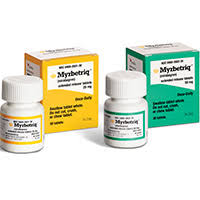Myrbetriq
Myrbetriq, known generically as mirabegron, is a prescription medication meticulously crafted to address specific bladder conditions. It is primarily indicated for adults experiencing overactive bladder (OAB), offering a refined approach to mitigate symptoms such as urinary urgency, frequency, and urge incontinence. Myrbetriq is distinguished as the first beta-3 adrenergic receptor agonist to receive approval for…

